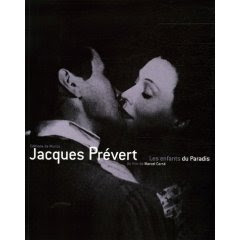
Jacques Prevert in Paris, with friend
"I like spring,but it is too young, i like summer, but it is too proud. So I like best of all autumn, because it's tone is mellower, it's colours are richer,
and it is tinged with a little sorrow."
- Lin Yutang
"It was one of those perfect English autumnal days which occur more frequently in memory than in life"
- P.D. James
February at last, and here I'm writing something autumn-related!
Yes, I'm a little slow on the uptake at times; it's just that I came upon an upcoming birthday notice (February 4, 1900) for the French poet/lyricist, screenwriter, and - here's the tie - purveyor of the "original" Autumn Leaves lyric, Jacques Prevert. Of course the original title in French for the song was "Les Feuilles Mortes", the English translation resonating with a thud as "The Dead Leaves". those of us with a musical ear, would have hoped for the melodious and visually attractive French word "automne" in the title; not to be! At this point, I would add that the English version of the lyrics, written by Johnny Mercer, are, though exquisite, quite different.
Here, with the introductory verse and the refrain - which accompanies the gorgeous melody known to all, of Prevert's musical collaborator Joseph Kosma - is the French "Les Feuilles" followed by a fairly literal translation into English by Chuck Perrin:
Oh! je voudrais tant que tu te souviennes
Des jours heureux oů nous étions amis
En ce temps-la la vie était plus belle,
Et le soleil plus brűlant qu'aujourd'hui
Les feuilles mortes se ramassent a la pelle
Tu vois, je n'ai pas oublié...
Les feuilles mortes se ramassent a la pelle,
Les souvenirs et les regrets aussi
Et le vent du nord les emporte
Dans la nuit froide de l'oubli.
Tu vois, je n'ai pas oublié
La chanson que tu me chantais.
C'est une chanson qui nous ressemble
Toi, tu m'aimais et je t'aimais
Et nous vivions tous deux ensemble
Toi qui m'aimais, moi qui t'aimais
Mais la vie sépare ceux qui s'aiment
Tout doucement, sans faire de bruit
Et la mer efface sur le sable
Les pas des amants désunis.
those happy days when we were friends.
Life in those times was so much brighter
and the sun was hotter than today.
Dead leaves picked up by the shovelful.
You see, I have not forgotten.
Dead leaves picked up by the shovelful,
memories and regrets also,
and the North wind carries them away
into the cold night of oblivion.
You see, I have not forgotten
the song that you sang for me:
It is a song resembling us.
We lived together, the both of us,
you who loved me
and I who loved you.
But life drives apart those who love
ever so softly
without a noise
and the sea erases from the sand
the steps of lovers gone their ways.
My favorite musical version of "Autumn Leaves" is the Miles Davis / Cannonball Adderley take from Somethin' Else. The misterioso introduction, ending vamp and Miles' bare and elegant solo. Most "poetic" of all, his choice to resolve the line on the 6th (E against G minor) of the chord in the 7th bar, rather than the expected minor 3rd. I like to think Prevert tipped his hat to that.
one more poem by Jacques:
Paris at Night
Trois allumettes une à une allumées dans la nuit
La premiére pour voir ton visage tout entier
La seconde pour voir tes yeux
La dernière pour voir ta bouche
Et l'obscuritè tout entière pour me rappeler tout cela
En te serrant dans mes bras.
Three matches one by one struck in the night
The first to see your face in it's entirety
The second to see your eyes
The last to see your mouth
And the darkness all around to remind me of all these
As I hold you in my arms.
Here is a lovely version in French by Yves Montand that starts with a reading of the verse.







